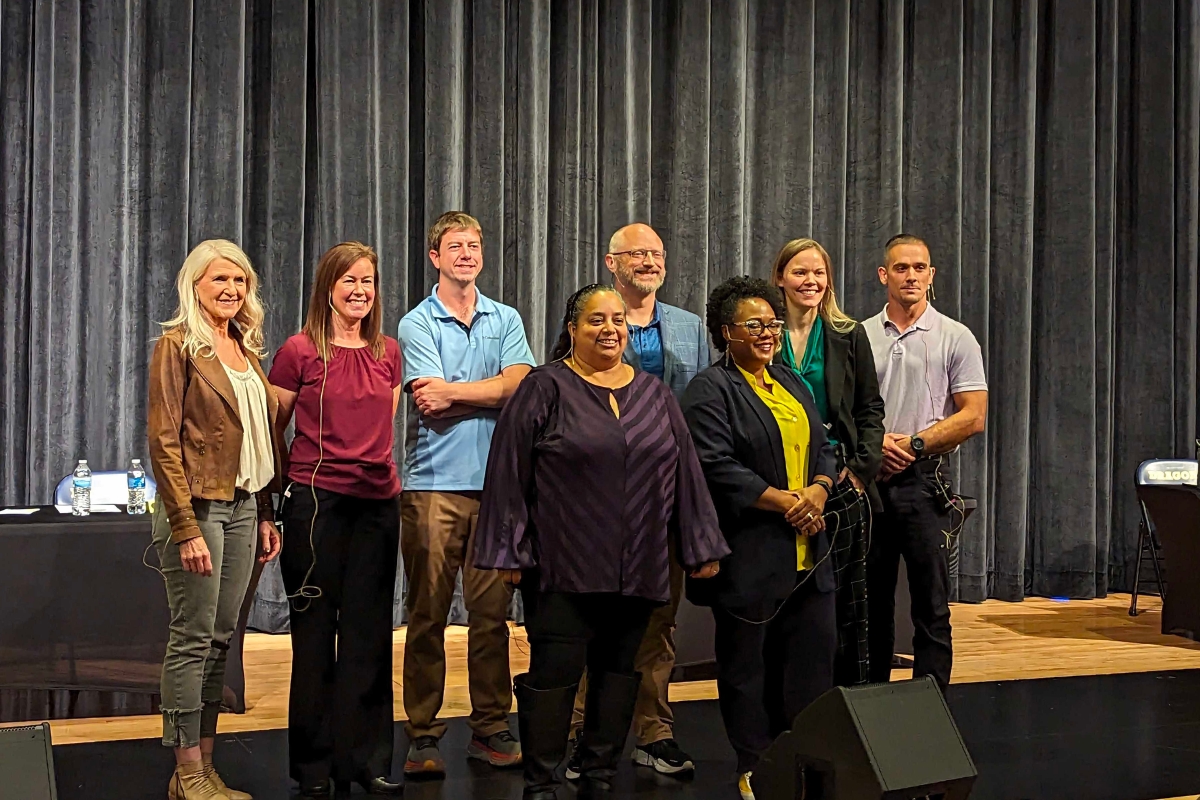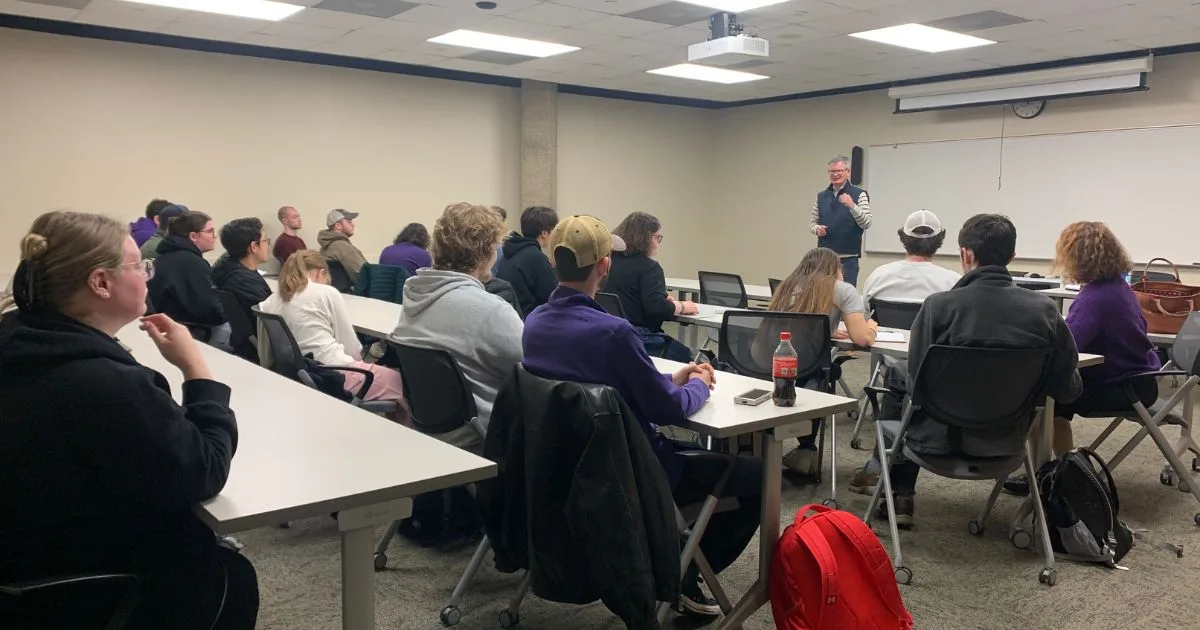
All eight 2023 Johnston School Board candidates.
The demographics of the Johnston School District are becoming more diverse, which is why the district has tried to place an increased emphasis on diversity, equity, and inclusion (DEI) efforts.
Part of the district’s mission statement is to “commit all district resources to guide the learning of all students to graduate as confident learners with character, knowledge, and the skills to excel in any endeavor they pursue.”
The increased efforts on equity have been a flashpoint in the district as some white and more conservative parents have pushed back on DEI measures intended to erase barriers for all students. Johnston has been without a DEI director for over a year, and there has been resistance by some current board members to fill the opening.
All eight Johnston School Board candidates had a chance to share their thoughts on the subject during Thursday’s candidate forum at Johnston High School. The race includes four left-leaning candidates; Jason Arnold, Jennifer Chamberland (incumbent), Soneeta Mangra-Dutcher (incumbent), and Lya Williams, and four conservative candidates; Josh Nelson, Charles Steele, Lori Stiles, and Michelle Veach.
The election is on Nov. 7.
At the forum, moderator Dr. Linda Serra Hagedorn of the Iowa League of Women Voters asked the candidates whether diversity, equity, and inclusion (DEI) would factor into their decision-making as a school board member.
Veach said students are unique and need opportunities to meet their needs, but did not support factoring demographics into that formula.
“We must place our value not in demographics, but in the good character and actions of our students,” she said. “Our kids will thrive in a culture where we focus on what unites us as a community.”
Nelson said board members should be inclusive to everyone, but diversity means more than just race or ethnic backgrounds and should include people who have disabilities, which DEI does. He suggested an individualized educational approach for each student.
Williams talked about how important DEI is and how vital it would be as demographics continue to shift in the district. She noted Johnston was 91% white in 2010 and was 80% white a decade later.
“We are set to become even more diverse in the coming years. The ‘D’ part of DEI is about recognizing and celebrating this diversity and ensuring staff and students know how to interact with people from different backgrounds,” she said. “This is an important life skill for students as they will be navigating an increasingly global economy.”
Arnold said he is guided by the district’s mission and vision, which is about the success and well-being of all students. To truly do that, he said, the district needs DEI at the forefront of the decision-making process.
“I’ll champion DEI initiatives that promote social, emotional learning and create a positive, inclusive school culture where every student—regardless of their identity, ability, or unique learning needs—feels valued and included,” Arnold said.
Chamberland noted people’s desire to return the district to what it was in 2001 isn’t feasible because of how much the city and school system have grown. Johnston’s population has increased 178% since then, while the district’s certified enrollment has climbed by 63%.
“The world isn’t what it was 20 years ago,” Chamberland said.
Chamberland said the board set a goal for interim superintendent Nikki Roorda to improve education equity among the district’s subgroups because the data shows there are performance differences they want to address.
Stiles said she will support decisions that give every student in their respective grade levels “equal opportunity for achievement, all equally striving for the highest degree of excellence,” that they are capable of.
“The bottom line is that students are people, individuals, and categorizing them by skin color or by gender or by supposed sexual orientation or economic status is antithetical to the decision-making,” she said. “It’s antithetical to providing equal opportunity and really has no place in decision-making.
Steele said he wants a district culture dedicated to academic success, and the board should focus on the “equality of intellectual achievement and finding diverse ways to make that happen,” while preparing students for college or the workforce.
Mangra-Dutcher, who is the first woman of color to serve on the Johnston School Board, said DEI work is vital because it helps students and teachers from different backgrounds find common ground and a mutual understanding.
“Sometimes it’s really hard for a student to relate to a teacher, especially when they don’t see themselves represented in the district or represented in the teaching staff,” she said. “We need to work on how teachers approach students and how the district looks, so that our students feel comfortable here.”
WATCH: You can watch the Johnston School Board candidate forum in its entirety here: https://team1sports.com/johnston/?bfplayvid=704786
by Ty Rushing
10/20/23
If you enjoy stories like these, make sure to sign up for Iowa Starting Line’s main newsletter.
To contact Senior Editor Ty Rushing for tips or story ideas, email him at [email protected] or find him on social media @Rushthewriter.
Iowa Starting Line is part of an independent news network and focuses on how state and national decisions impact Iowans’ daily lives. We rely on your financial support to keep our stories free for all to read. You can contribute to us here. Also follow us on Facebook and Twitter.
Politics

Biden marks Earth Day by announcing $7 billion in solar grants
The Biden administration on Monday announced the recipients of its Solar For All Program, a $7 billion climate program that aims to lower energy...

6 terrifying things that could happen if the Comstock Act is used to target abortion
Does 1873 sound like a really, really long time ago? Well, that’s because it is—but if Republicans and far-right anti-abortion activists have their...
Local News

No more Kum & Go? New owner Maverik of Utah retiring famous brand
Will Kum & Go have come and gone by next year? One new report claims that's the plan by the store's new owners. The Iowa-based convenience store...

Here’s a recap of the biggest headlines Iowa celebs made In 2023
For these famous Iowans, 2023 was a year of controversy, career highlights, and full-circle moments. Here’s how 2023 went for the following Iowans:...





